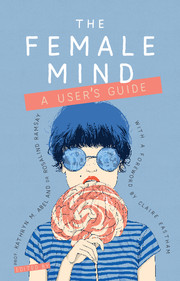Book contents
- Frontmatter
- Acknowledgements
- Contents
- Foreword
- Introduction: being female
- Part I Women in perspective
- Part II Women and society
- Part III Women and their environment
- Part IV Women and specific disorders
- Part V Women and treatment
- 33 What women want from medication
- 34 What women want from services: a patient's perspective
- 35 Complementary and alternative therapies
- Contributors
- Index
33 - What women want from medication
from Part V - Women and treatment
Published online by Cambridge University Press: 02 January 2018
- Frontmatter
- Acknowledgements
- Contents
- Foreword
- Introduction: being female
- Part I Women in perspective
- Part II Women and society
- Part III Women and their environment
- Part IV Women and specific disorders
- Part V Women and treatment
- 33 What women want from medication
- 34 What women want from services: a patient's perspective
- 35 Complementary and alternative therapies
- Contributors
- Index
Summary
Emma's story
Emma, a 26-year-old woman, was depressed a year after the death of her newborn son. She had tried the usual forms of counselling and bereavement support, but they had not worked for her, and her general practitioner (GP) had prescribed an antidepressant. Emma remained low in mood, could not enjoy anything or be cheered up, had poor appetite and sleep, difficulty in concentrating and forgetfulness. She did not enjoy her work at a local bank and her partner was becoming frustrated with her ongoing misery. Her GP changed her antidepressant to another drug. A few weeks later, Emma was much improved, and pregnant – something that had not been discussed at the initial appointment, when she still felt guilty and not ready to have another child. After much discussion and consultation, Emma and her GP made the collaborative decision to continue the use of the antidepressant throughout the pregnancy and not to breastfeed. Emma did well and delivered a healthy baby boy.
Over the next few years, Emma had a number of depressive relapses, usually in response to family problems. This included the suicide of a close relative (Emma had an extensive family history of mental illness). Various medications were tried, and eventually a combination of drugs proved helpful. Emma was then able to complete an intensive course of psychodynamic therapy, focusing on her problematic relationship with her mother. Emma was able to change her perspective and as a result became less vulnerable to future episodes of depression. She left the bank and began working as a carer, a new career she loves. She recently weathered a serious cancer scare without any relapse into depression.
Emma's story demonstrates that pharmaceutical treatment can be effective, even in patients with major mental illness, without serious side-effects. Medication and psychotherapy are not mutually exclusive and many women need both, but they will have to be well enough to be able to benefit from psychological treatment approaches. Also required are a flexible approach on the part of the psychiatrist and much persistence on the part of the patient.
On the surface, there would seem to be no reason why women would want anything different from men from the medications they take. Everyone wants treatment to be effective, work quickly and have no side-effects.
- Type
- Chapter
- Information
- The Female MindUser's Guide, pp. 221 - 226Publisher: Royal College of PsychiatristsPrint publication year: 2017

